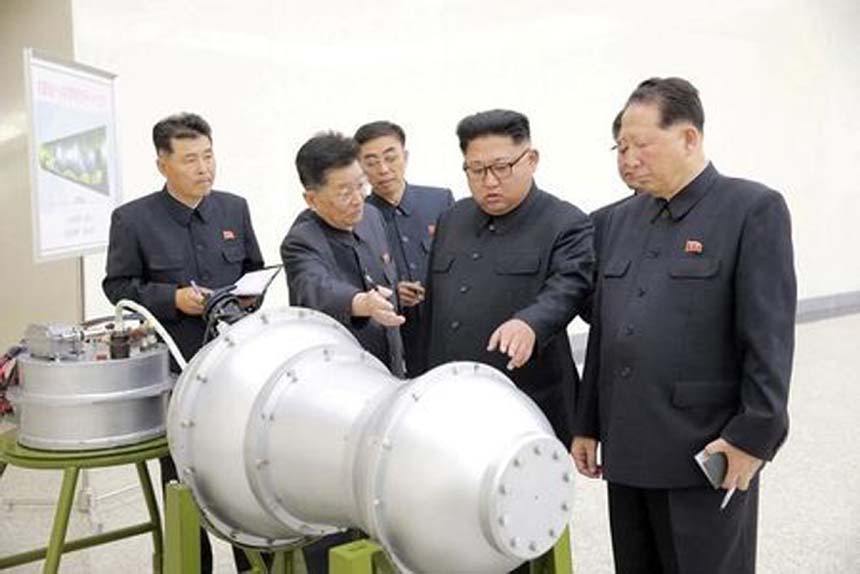
AFP, Seoul :
Radio signals and radar activity detected at a North Korean missile base have raised concerns the reclusive regime may be preparing a new missile test, news reports in Seoul and Tokyo said Tuesday.
The North has stoked international alarm over its banned nuclear missile programme, but it has not launched a missile test since September 15, raising hopes that ramped-up sanctions are having an impact.
However, the South Korean news agency Yonhap cited a government source as saying that a missile-tracing radar was switched on at an unspecified base on Monday, and there had been a flurry of telecoms traffic.
“It’s true that active movements have been detected at a North Korean missile base,” the source reportedly said. “Signs like those spotted Monday have recently been detected frequently.”
“We need to watch a while longer before determining whether the North is preparing a missile launch or gearing up for (its own) winter drill that starts Friday.”
A South Korean defence ministry spokesman declined to comment on the report, but similar accounts from Tokyo caused a temporary slump on the stock exchange there.
The Kyodo news agency quoted sources as saying the Japanese government was on alert after detecting radio signals suggesting North Korea might be preparing for a missile launch.
“North Korea might launch a missile within the next few days,” one of the sources was quoted as saying.
However, the Japanese sources also said that as satellite images have not shown any missile or moveable launch pad, the signals might only be related to winter training for the North Korean military.
North Korea’s leader Kim Jong-Un visited a new catfish farm northeast of Pyongyang, its state media said Tuesday, in the latest of a series of economic outings that have coincided with a lull in weapons testing.
In September the North conducted its sixth and most powerful nuclear test and staged an intermediate-range missile launch over Japan.
But tensions are expected to spike again as the United States and South Korea kick off a large-scale air force drill on Monday in a new show of force against the North.
The five-day exercise, Vigilant Ace, involves 12,000 US personnel and an unspecified number of South Korean service members flying more than 230 aircraft including F-22 Rapter stealth fighters and other cutting-edge weapons at US and South Korean military bases.
Pyongyang routinely condemns such exercises, labelling them preparation for war.
The US last week unveiled fresh sanctions that target North Korean shipping, raising pressure on Pyongyang to abandon its nuclear programme.
Pyongyang condemned the move as a “serious provocation” on Wednesday and warned that sanctions would never succeed.
Japan detects radio signals pointing to possible North Korea missile test: source
TOKYO/WASHINGTON (Reuters) – Japan has detected radio signals suggesting North Korea may be preparing another ballistic missile launch, although such signals are not unusual and satellite images did not show fresh activity, a Japanese government source said on Tuesday.
After firing missiles at a pace of about two or three a month since April, North Korean missile launches paused in September, after it fired a rocket that passed over Japan’s northern Hokkaido island.
“This is not enough to determine (if a launch is likely soon),” the source told Reuters.
Japan’s Kyodo news agency reported late on Monday that the Japanese government was on alert after catching such radio signals, suggesting a launch could come in a few days. The report also said the signals might be related to winter military training by the North Korean military.
North Korea is pursuing its nuclear weapons and missile programmes in defiance of U.N. Security Council sanctions and has made no secret of its plans to develop a missile capable of hitting the U.S. mainland. It has fired two missiles over Japan.
South Korea’s Yonhap news agency, citing a South Korean government source, also reported that intelligence officials of the United States, South Korea and Japan had recently detected signs of a possible missile launch and have been on higher alert.
South Korean Unification Minister Cho Myoung-gyon told reporters on Tuesday there have been “noteworthy” movements from the North since its last missile launch in mid-September, but there was no hard evidence of another nuclear or missile test.
“North Korea hasn’t been engaging in new nuclear or missile tests but recently we’ve seen them persistently testing engines and carrying out fuel tests,” said Cho at a media event in Seoul.
“But we need some more time to see whether these are directly related to missile and nuclear tests.”
Asked about the media reports, Pentagon spokesman Colonel Robert Manning told reporters the United States continued to watch North Korea very closely.
“This is a diplomatically led effort at this point, supported by military options,” he said.
“The Republic of Korea and U.S. alliance remains strong and capable of countering any North Korean provocations or attacks.”
Two U.S. government sources familiar with official assessments of North Korean capabilities and activities said that while they were not immediately familiar with recent intelligence suggesting that North Korea was preparing to launch a new missile test, the U.S. government would not be surprised if such a test were to take place in the very near future.
Other U.S. intelligence officials noted North Korea has previously sent deliberately misleading signs of preparations for missile and nuclear tests, in part to mask real preparations, and in part to test U.S. and allied intelligence on its activities.
South Korea’s Cho said North Korea may announce the completion of its nuclear programme within a year, as it is moving more faster than expected in developing its arsenal.
North Korea defends its weapons programmes as a necessary defence against U.S. plans to invade. The United States, which stations 28,500 troops in South Korea, a legacy of the 1950-53 Korean war, denies any such intention.

